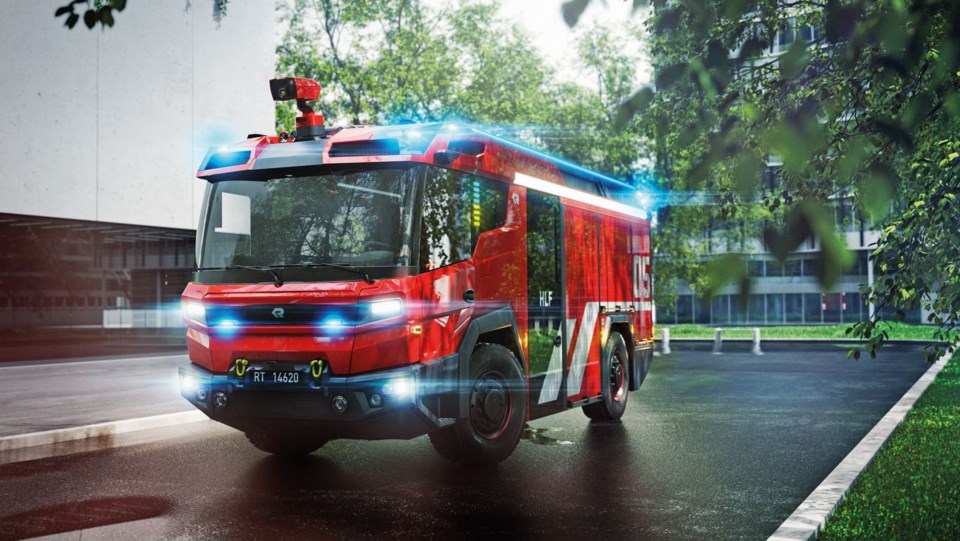Vancouver is going to be on the leading edge of firetruck technology soon.
Vancouver Fire Rescue Services has placed an order for the Rosenbauer RT, an electric firetruck. It's expected to arrive in late 2022, says Deputy Chief Tyler Moore, and after firefighters are trained on it locals should see it on the streets in 2023.
"Rosenbauer ran a program looking at the future of firefighting; one of the things that came out of their multiyear project was an electric firetruck," Moore tells Vancouver Is Awesome in a phone interview. "They were the first to come to the market and so we were the first Canadian fire department to put in an order."
Three other electric firetrucks are currently deployed in the world, in Berlin, Amsterdam and Dubai. Los Angeles is getting one built right now. Vancouver's is next on the list, Moore says; when staff went over to Austria recently they saw the pump partially assembled for the Vancouver truck.
Wait, what's a Rosenbauer RT?
The Rosenbauer RT is a pump truck; it rolls up to a fire and hooks into a hydrant or water source and pumps that water onto the fire through a hose. While that's its specialized purpose it can handle all medical and rescue tasks as well, like any other diesel pump truck.
There are a few differences between the usual trucks and the new one. Obviously, the biggest is the power source.
The system is set to be recharged incredibly quickly and can power the truck for 100 km of driving; Moore notes that in Vancouver they usually only drive five to 10 km, and never anywhere near 100 km. And if they do need power for an extended period of time there is a range extender, a 350 hp diesel engine from BMW which can refill the batteries faster than driving depletes them. Using that it can go another 300 to 400 km.
The electric system also powers the pump, a 1,500-gallon-per minute system. With the pressure provided by the city's hydrants, the pump can for three to four hours on battery, or up to nine hours using the range extender; this is all very similar to conventional trucks, Moore says.
In Berlin the range extender has only been needed twice, the city's fire chief told Vancouver staff, Moore adds, and the truck has operated 99.81 per cent full electric.
The current model of the Rosenbauer RT doesn't come with a larger pump which some Vancouver firetrucks have (a 2,250 gallon per minute version), Moore says. These are used for fires in highrise buildings. It's possible for future models to have that as an option, though.
Aside from its electric engines, the biggest difference will be in the driving and handling of the truck.
The Rosenbauer is smaller than conventional pump trucks, which is something the fire department's truck committee has been asking for. A usual truck is over 100 inches wide, and then the mirrors are extra. The new truck is 92 inches, and the mirrors don't stick out. That makes it easier to drive through tight areas and city traffic.
Additionally, it's four-wheel drive and steering, which means it can move diagonally into positions.
Oh, and there's the speed. Diesel firetrucks aren't the fastest moving vehicles out of the gate, but anyone who's seen a Tesla in ludicrous mode knows electric vehicles are all about acceleration.
"It's got a lot of power," Moore says. "Electric vehicles have a lot of get up and go, it has a lot of that."
Another benefit he's excited for is the safety aspect for firefighters, which has a few pieces. The trucks are quieter, aside from the sirens, and cleaner. That means firefighters won't be breathing in diesel fumes for hours on end while driving or on the scene.
"This is about the health and safety of our firefighters as well as being electrified," Moore says. "This truck offers a lot of things that'll keep firefighters safer."
It also has four variable heights, with one for high water, an offroad option, a standard position and one setting for when it's stationary; a common injury for firefighters is twisted ankles from getting out of the truck, along with similar injuries to knees and backs.
Unlike many other leading-edge technologies, the cost difference between the new electric firetruck and a conventional diesel truck isn't massive, Moore notes. A new diesel truck right now would cost the department around $1.2 million Canadian. The Rosenbauer RT will cost $1.2 million USD; the difference in costs will depend on the currency market.
Future of the fleet?
Vancouver has more than 30 diesel firetrucks but while the numbers look good for the Rosenbauer RT, don't expect them to disappear off the city's roads too soon. Moore notes in 2016 half the fleet was replaced, and they usually spend 15 years on the frontlines.
"As we go, if it's like for like, and it meets our operational needs it's possible to move to a fully electric fleet," Moore says.
However, they'll have to see how the first truck handles Vancouver. While there's excitement to get it out and running in 2023, it needs to meet the needs of the city, first and foremost, but Moore is confident it will.
"The National Fire Protection Association requirements are all being met," he says. "We're very satisfied that this will meet all of our needs."



